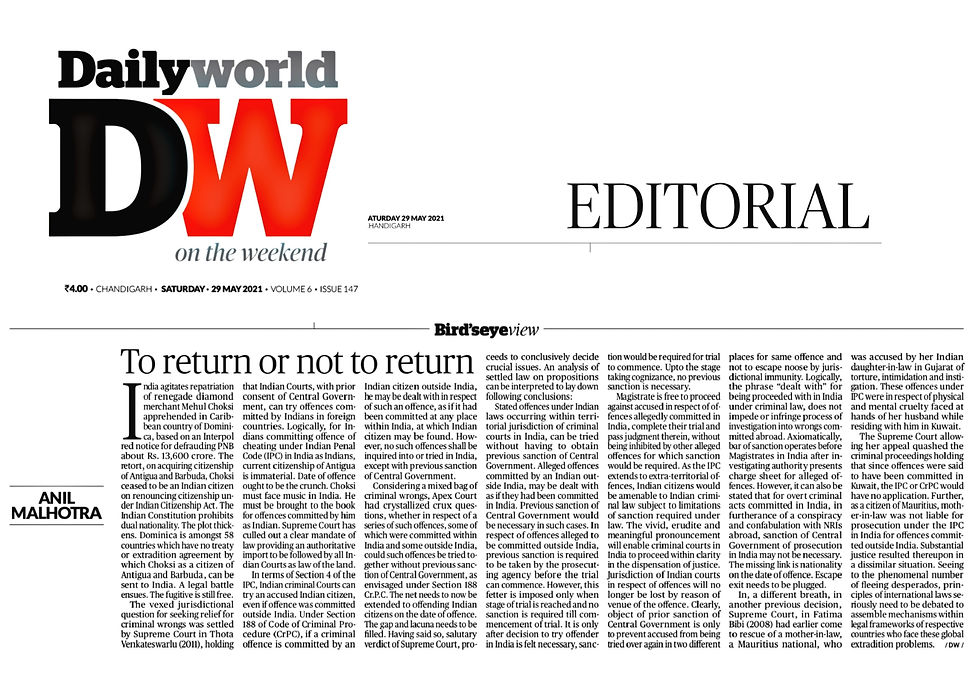To return or not to return
- anilmalhotra1960
- Jan 12, 2022
- 4 min read

This Article is authored by Advocate Anil Malhotra.
India agitates repatriation of renegade diamond merchant Mehul Choksi apprehended in Caribbean country of Dominica, based on an Interpol red notice for defrauding PNB about Rs. 13,600 crore. The retort, on acquiring citizenship of Antigua and Barbuda, Choksi ceased to be an Indian citizen on renouncing citizenship under Indian Citizenship Act. The Indian Constitution prohibits dual nationality. The plot thickens. Dominica is amongst 58 countries which have no treaty or extradition agreement by which Choksi as a citizen of Antigua and Barbuda, can be sent to India. A legal battle ensues. The fugitive is still free.
The vexed jurisdictional question for seeking relief for criminal wrongs was settled by Supreme Court in Thota Venkateswarlu (2011), holding that Indian Courts, with prior consent of Central Government, can try offences committed by Indians in foreign countries. Logically, for Indians committing offence of cheating under Indian Penal Code (IPC) in India as Indians, current citizenship of Antigua is immaterial. Date of offence ought to be the crunch. Choksi must face music in India. He must be brought to the book for offences committed by him as Indian. Supreme Court has culled out a clear mandate of law providing an authoritative import to be followed by all Indian Courts as law of the land.
In terms of Section 4 of the IPC, Indian criminal Courts can try an accused Indian citizen, even if offence was committed outside India. Under Section 188 of Code of Criminal Procedure (CrPC), if a criminal offence is committed by an Indian citizen outside India, he may be dealt with in respect of such an offence, as if it had been committed at any place within India, at which Indian citizen may be found. However, no such offences shall be inquired into or tried in India, except with previous sanction of Central Government.
Considering a mixed bag of criminal wrongs, Apex Court had crystallized crux questions, whether in respect of a series of such offences, some of which were committed within India and some outside India, could such offences be tried together without previous sanction of Central Government, as envisaged under Section 188 Cr.P.C. The net needs to now be extended to offending Indian citizens on the date of offence. The gap and lacuna needs to be filled. Having said so, salutary verdict of Supreme Court, proceeds to conclusively decide crucial issues. An analysis of settled law on propositions can be interpreted to lay down following conclusions:
Ø Stated offences under Indian laws occurring within territorial jurisdiction of criminal courts in India, can be tried without having to obtain previous sanction of Central Government.
Ø Alleged offences committed by an Indian outside India, may be dealt with as if they had been committed in India. Previous sanction of Central Government would be necessary in such cases.
Ø In respect of offences alleged to be committed outside India, previous sanction is required to be taken by the prosecuting agency before the trial can commence. However, this fetter is imposed only when stage of trial is reached and no sanction is required till commencement of trial. It is only after decision to try offender in India is felt necessary, sanction would be required for trial to commence. Upto the stage taking cognizance, no previous sanction is necessary.
Ø Magistrate is free to proceed against accused in respect of offences allegedly committed in India, complete their trial and pass judgment therein, without being inhibited by other alleged offences for which sanction would be required.
Ø As the IPC extends to extra-territorial offences, Indian citizens would be amenable to Indian criminal law subject to limitations of sanction required under law.
The vivid, erudite and meaningful pronouncement will enable criminal courts in India to proceed within clarity in the dispensation of justice. Jurisdiction of Indian courts in respect of offences will no longer be lost by reason of venue of the offence. Clearly, object of prior sanction of Central Government is only to prevent accused from being tried over again in two different places for same offence and not to escape noose by jurisdictional immunity. Logically, the phrase “dealt with” for being proceeded with in India under criminal law, does not impede or infringe process of investigation into wrongs committed abroad. Axiomatically, bar of sanction operates before Magistrates in India after investigating authority presents charge sheet for alleged offences. However, it can also be stated that for overt criminal acts committed in India, in furtherance of a conspiracy and confabulation with NRIs abroad, sanction of Central Government of prosecution in India may not be necessary. The missing link is nationality on the date of offence. Escape exit needs to be plugged.
In, a different breath, in another previous decision, Supreme Court, in Fatima Bibi (2008) had earlier come to rescue of a mother-in-law, a Mauritius national, who was accused by her Indian daughter-in-law in Gujarat of torture, intimidation and instigation. These offences under IPC were in respect of physical and mental cruelty faced at hands of her husband while residing with him in Kuwait. Supreme Court allowing her appeal quashed the criminal proceedings holding that since offences were said to have been committed in Kuwait, the IPC or CrPC would have no application. Further, as a citizen of Mauritius, mother-in-law was not liable for prosecution under the IPC in India for offences committed outside India. Substantial justice resulted thereupon in a dissimilar situation.
Seeing to the phenomenal number of fleeing desperados, principles of international laws seriously need to be debated to assemble mechanisms within legal frameworks of respective countries who face these global extradition problems. This needs urgent and immediate deliberation at worldwide platforms for common unified declarations to detain intercontinental criminals. Law cannot be a silent spectator. Supreme Court judgments point to this much needed path of resolution.
Comments